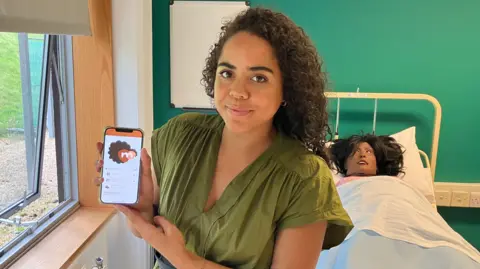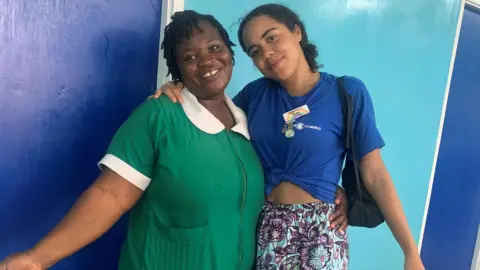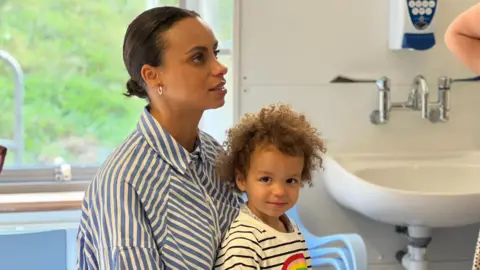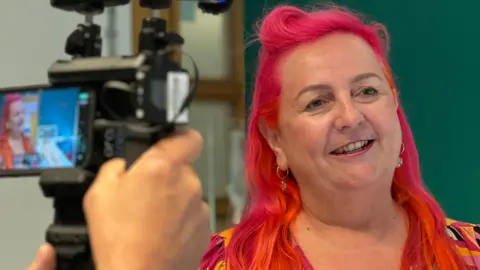Amy Walker
BBC News, South East

BBC
Trainee midwife Ruby Jackson hopes to pilot the app across an NHS trust
A student midwife has created an app to help raise awareness of the symptoms of maternal and neonatal conditions on black and brown skin.
Ruby Jackson, 23, said she was inspired to create "Melanatal" due to a general lack of understanding about how some conditions present in people who are not white.
It will offer patients and clinicians visual guides to the signs and symptoms of conditions including jaundice, pre-eclampsia and mastitis.
The University of Brighton student, who has secured a place on the NHS clinical entrepreneur programme, hopes to pilot the app within a trust upon its completion.
A report last year found that between 2019 and 2021 woman from black ethnic backgrounds were four times more likely to die during pregnancy or immediately afterwards than white women.
Ms Jackson, who lives in Streatham, south London, said she was inspired to create the app after visiting a neonatal intensive care unit during a placement in Ghana.
Trainee midwife Ruby Jackson hopes to pilot the app across an NHS trust
A student midwife has created an app to help raise awareness of the symptoms of maternal and neonatal conditions on black and brown skin.
Ruby Jackson, 23, said she was inspired to create "Melanatal" due to a general lack of understanding about how some conditions present in people who are not white.
It will offer patients and clinicians visual guides to the signs and symptoms of conditions including jaundice, pre-eclampsia and mastitis.
The University of Brighton student, who has secured a place on the NHS clinical entrepreneur programme, hopes to pilot the app within a trust upon its completion.
A report last year found that between 2019 and 2021 woman from black ethnic backgrounds were four times more likely to die during pregnancy or immediately afterwards than white women.
Ms Jackson, who lives in Streatham, south London, said she was inspired to create the app after visiting a neonatal intensive care unit during a placement in Ghana.

HANDOUT
Ruby Jackson said she was inspired after a placement at a maternity clinic in Ghana
"They were showing us a baby and saying 'this baby is here because it has jaundice' and showing us what they were looking at, for example the soles of the feet and the whites of the eyes," she said.
"At university we were taught [to look for] yellow skin."
She said the experience made her realise she could have previously "missed" the signs for certain conditions.
Ruby Jackson said she was inspired after a placement at a maternity clinic in Ghana
"They were showing us a baby and saying 'this baby is here because it has jaundice' and showing us what they were looking at, for example the soles of the feet and the whites of the eyes," she said.
"At university we were taught [to look for] yellow skin."
She said the experience made her realise she could have previously "missed" the signs for certain conditions.

UNIVERSITY OF BRIGHTON
Maggie Myatt, pictured with her daughter Cleo, said there was a lack of "visual information" that showed different conditions on black and brown skin
After securing a place on the NHS entrepreneur programme, Ms Jackson was given the opportunity to pitch her idea to digital health solutions firms Amazon Web Services Healthcare, Cogniss and The Validitron.
She was named as one of the winners in June, securing 12 months of mentorship and business support to create the app.
Sussex midwife Maggie Myatt, who is also a mother, said the app could mean "families can access their GPs sooner".
She said: "Medical professionals can recognise these conditions sooner and be able to do something about it before it becomes more serious."
Maggie Myatt, pictured with her daughter Cleo, said there was a lack of "visual information" that showed different conditions on black and brown skin
After securing a place on the NHS entrepreneur programme, Ms Jackson was given the opportunity to pitch her idea to digital health solutions firms Amazon Web Services Healthcare, Cogniss and The Validitron.
She was named as one of the winners in June, securing 12 months of mentorship and business support to create the app.
Sussex midwife Maggie Myatt, who is also a mother, said the app could mean "families can access their GPs sooner".
She said: "Medical professionals can recognise these conditions sooner and be able to do something about it before it becomes more serious."

UNIVERSITY OF BRIGHTON
Thelma Lackey said the university "recognised" a general lack of knowledge about how symptoms presented in non-white people
The app is currently being developed using "hyper-realistic" medical illustrations and photographs.
Thelma Lackey, a senior lecturer at the university's School of Education, Sports and Health Science, said the "knowledge gap around recognising different conditions of different coloured skin" was a national problem.
"We have updated all our PowerPoints and all our teaching materials, and when we talk about [for example] a deteriorating woman, we don’t say the sign is 'Oh they’ll go pale'; we talk about how that would look different in different women," said Ms Lackey.
Thelma Lackey said the university "recognised" a general lack of knowledge about how symptoms presented in non-white people
The app is currently being developed using "hyper-realistic" medical illustrations and photographs.
Thelma Lackey, a senior lecturer at the university's School of Education, Sports and Health Science, said the "knowledge gap around recognising different conditions of different coloured skin" was a national problem.
"We have updated all our PowerPoints and all our teaching materials, and when we talk about [for example] a deteriorating woman, we don’t say the sign is 'Oh they’ll go pale'; we talk about how that would look different in different women," said Ms Lackey.
No comments:
Post a Comment